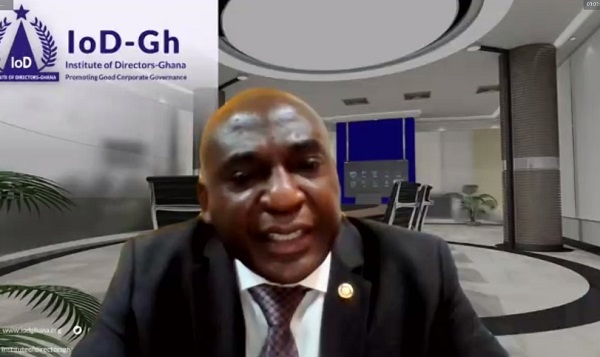
IoD-Gh inaugurates National Corporate Governance Code committee
The Institute of Directors, Ghana (IoD-Gh) has inaugurated an 18-member National Corporate Governance Code Project Committee to among other things, guide and coordinate the development of a National Corporate Governance Code for Ghana.
The committee is expected to handle pertinent activities throughout the lifecycle of the project, with members offering functional and technical expertise in varying capacities to facilitate the development, ratification and implementation of the National Corporate Governance Code for Ghana.
IoD-GH President, Rockson Kwesi Dogbegah, who inaugurated the committee with members nominated from various stakeholder private and the public sector institutions, said a project directorate has been established to ensure a successful execution of the project as per the project charter.
Members of the committee are; Lawrence Ayitey, National Banking College; Marian M. Dsane, Ghana Securities Industry Association; William Darbi, Ghana Institute of Management and Public
Administration (GIMPA); Edward Ashong-Lartey, Ghana Investment Promotion Centre; Donatus Kwesi Freitas, Bank of Ghana; Richard Ruttmern, Securities and Exchange Commission (SEC); Eric A. Opoku, State Interests and Governance Authority (SIGA); Esther Armah, National Insurance Commission; and Patience Ella Diaba, Ghana Bar Association.
The rest are Dr. Frank Boateng, Prof. Albert Puni, Prof. John Bright Kobla Aheto, Professor Teerooven Soobaroyen, Dr. Danson Kimani, Dr. Renata Konadu, Dr. John Malagila, Dr. Brinda Mahadeo, and Professor Collins Ntim.
Mr. Dogbegah said the IoD-Gh and the Bank of Ghana, in collaboration with other key stakeholders recently held a multi-stakeholder meeting at which a project to develop a National Corporate Governance Code was launched.
He said participants at the meeting unanimously agreed on the importance of good corporate governance in building strong institutions, communities, economies, and the nation, as well as helping to avoid the collapse of businesses.
“The NCGC Project therefore seeks to harmonize the different industry and sector specific governance codes as currently exists into a national code that will provide ease of compliance and reference, to promote the culture of good corporate governance for public and private organizations. The code would not only serve as a unified national corporate governance reference for good corporate governance for all stakeholders in the country, but would also seek to enhance Ghana's global appeal as an investment destination, provide clarity, inclusiveness, harmony and synergy, and boost investor interest and confidence as the harmonized code is expected to be in conformity with international best practices.”
Mr. Dogbegah spelt out four project objectives that all committees under the project would be mandated to help realise;
- To develop a Ghana national corporate governance code for the public and private sector actors, contextualised on Ghanaian values, recognizing all the existing sectorial codes, and leveraging collaboratively on all on-going efforts and work by all stakeholders within one year.
- To submit the Code to wide national consultation and review across relevant stakeholder groups.
- To ensure the ratification and adoption of the Code through effective implementation mechanisms, adequate publicity, advocacy and sensitization.
- To set up a framework for subsequent reviews and amendments of the Code.
While congratulating members of the National Corporate Governance Code committee for agreeing to put their professional expertise in support of a national cause, Mr. Dogbegah reminded the nominees that “this is a voluntary service and you must all consider it as a national service to Ghana and therefore an honour and a privilege to be part of this historic project. We will require a lot of dedication and commitment to the project from you.”
He also appealed to all stakeholders to support the project financially, thanking the Southampton University, UK for providing sponsorship to kick-start the project and to a member of the committee, Prof Collins Ntim and his colleagues, who he said would be external consultants to support the work of the technical committee.